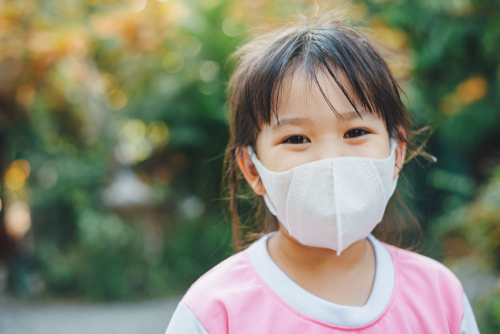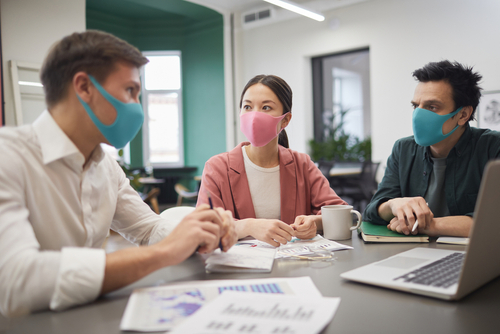
How Often Should I Disinfect Office Reception Area?
September 1, 2021
How To Protect Myself From The Delta Variant?
September 29, 2021How Wearing Masks Can Reduce the Risk Of Viruses?

How Wearing Masks Can Reduce the Risk Of Viruses? Medical professionals often recommend mask-wearing to prevent diseases like the flu, but many people find them uncomfortable or inconvenient. However, recent research shows that masks can reduce a person’s risk of catching a virus even if they don’t wear one all day. Here are ways that wearing a mask can save you from falling ill:
Breathing Easier

Wearing a mask will protect your nose and mouth from being invaded by common viruses which you encounter every day. “Influenza is easily transmitted by small-particle aerosols,” Dr. Charles Gerba explains, so by covering yourself with a mask, you significantly cut down on how much of those particles enter your respiratory system.
Less Stressful Than Sneezing Into Your Hand

If you’ve ever seen someone sneeze into their hand, then wash it thoroughly afterward because they may have just picked up the flu virus, you know that it can be stressful to touch door handles or food after touching your hands to your face.
Sneezes spread around germs and viruses, which travel at over 200 mph, so if you don’t want to hassle with washing your hands several times a day because of all the germs on them, wearing a mask will cut down on how many times you have to do this.
Breathing In Cleaner Air Than Most People Do

Through research at Arizona State University, scientist Dr. Charles Gerba discovered that air in public places is filled with bodily fluids from other humans. With more than half a million different bacteria living in your respiratory system, when you inhale air from a public space, it carries these microorganisms with it into your body.
When you wear a mask, you reduce the risk of being exposed to air that’s been contaminated by others’ bacteria and viruses.
Decreased Risk Of Viruses Being Passed On To Others

If someone coughs or sneezes near you without covering their mouth or nose, they can distribute up to 10 billion virus particles through the air. That’s why hospitals encourage patients to wear masks, so people who visit them won’t catch what they have during their stay unless they touch something that an infected person has touched before touching their own face without washing their hands.
Decreased Risk Of Virus Exposure To Others
Medical professionals recommend that you avoid touching your mouth, nose, eyes, or any skin with unwashed hands because this can lead to cross-contamination of the virus on your skin. Preventing exposure by wearing a mask lessens this risk for yourself and others around you if they wear one too.
Decreased Risk Of Being Exposed To Germs From Sick Co-Workers
When you spend an afternoon at work around people who are sneezing and coughing all over the place, it’s easy to bring their germs home with you when you leave your job behind. Mask wearing reduces the risk of catching viruses before they enter your body during face-to-face interactions.
Feel Less Anxious During Flu Season

When you know that there are millions of people around you carrying germs and coughing and sneezing all over everything without covering their mouth, it can make you feel anxious that you’ll be exposed to something that will make you sick. Wearing a mask is a great way to alleviate some of this anxiety and lessen the stress of being around sick people during flu season.
Feel Less Self Conscious About Your Runny Nose Or Congested Voice

If your cold is terrible and it’s hard for you to do anything without coughing or sneezing all over yourself, or everyone around you, wearing a mask will help protect others from getting exposed to your viruses because of your clogged-up voice box or runny nose. It’s not uncommon for people with colds who are trying not to cough into their hands to still end up doing so after they’ve washed them thoroughly due to the nature of a congested throat.
Eliminate The Risk Of Contracting Viruses On Trains And Buses

Being stuck in rush hour traffic can make it hard to find a mask that fits your face well, but if this is the only way you can get to work and you’re concerned about contracting viruses from those around you, especially when there’s no need for close contact like in an airplane traveling over 10,000 feet above sea level or on a train where everyone has their own seat within several rows of one another, it’s important to choose comfort over convenience.
Reduce The Chances Of Spreading Germs To Family And Friends During Holiday Gatherings

If you know that you’ll be spending time with family and friends during cold and flu season because of special holiday gatherings, taking extra steps to ensure that they aren’t exposed to your germs will help them reduce their risk of getting sick.
Wearing a mask around loved ones will reduce the risk of them catching your cold or flu if they happen to sit next to you on the couch after you’ve been sneezing nonstop for three days straight.
Reduce The Chances Of Spreading Germs To Pets When You Come Home

Even though pets can’t wear masks, it’s not safe to cuddle with them when you’re sick because they’ll end up contracting your viruses and bringing them into their own homes where other members of the family can be exposed to them if they touch something that was covered in pet dander like a paw pad or fur. It’s best to keep your distance from your pets while you’re wearing a mask so that no one else gets exposed.
Stay Out Of Contact With People, Especially Children and Senior Citizens, Who Have A History of Asthma or Allergies

When you’ve got a virus that causes congestion and runny nose because the mucus in your sinuses is draining into your throat gland, it’s difficult to control yourself from doing things like coughing and sneezing all over others when they’re nearby.
Also, if your cold turns into bronchitis because the viruses have settled in your lungs while being exposed to dry air due to low humidity levels, you’ll have more difficulty breathing while wearing a face mask, so it’s best not to get too close to anyone with asthma or allergies which could be susceptible to respiratory issues if exposed to your viruses.
If you know someone in this situation who’s expecting you to make an appearance, it’s best to ask them if they mind wearing a mask while you’re together so that everyone can breathe easily during the gathering.
How Wearing Masks Can Reduce the Risk Of Viruses? – Conclusion

After being exposed to someone’s cold virus when they were coughing and sneezing all over themselves without covering their mouths, it can take up to two weeks for you to start showing your own symptoms of having a cold or flu.
Because of this, if you’ve got a cold or are prone to catching viral infections when people around you are sick, not only will wearing a mask reduces the risk of spreading viruses to others, it will also reduce the risk of you being exposed to someone else’s cold or flu when they sneeze on you accidentally.
We hope you enjoyed the article – “How Wearing Masks Can Reduce the Risk Of Viruses?” Stay safe and let’s all do our part and keep Singapore a safe place to live in!




